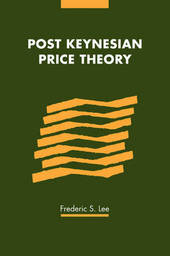
|
Post Keynesian Price Theory
Paperback / softback
Main Details
| Title |
Post Keynesian Price Theory
|
| Authors and Contributors |
By (author) Frederic S. Lee
|
| Series | Modern Cambridge Economics Series |
|---|
| Physical Properties |
| Format:Paperback / softback | | Pages:292 | | Dimensions(mm): Height 228,Width 152 |
|
| Category/Genre | Economic theory and philosophy |
|---|
| ISBN/Barcode |
9780521030212
|
| Classifications | Dewey:338.521 338.521 |
|---|
| Audience | | Professional & Vocational | |
|---|
| Illustrations |
Worked examples or Exercises
|
|
Publishing Details |
| Publisher |
Cambridge University Press
|
| Imprint |
Cambridge University Press
|
| Publication Date |
2 November 2006 |
| Publication Country |
United Kingdom
|
Description
Frederic Lee sets out the foundations of a post-Keynesian price theory through developing an empirically grounded production schema. The administered, normal cost and mark-up price doctrines are explained in parts I-III of the book, as many of their theoretical arguments are important for developing the foundations. This involves discussing the work of Gardiner Means, Philip Andrews, and Michal Kalecki as well as the developers of the doctrines, such as Edwin Nourse, Paolo Sylos Labini, Harry Edwards, Josef Steindl and Alfred Eisner. Drawing upon the arguments and formal modelling offered by the doctrines, in conjunction with empirical evidence from one hundred studies on pricing and production, Dr Lee develops an empirically grounded pricing model and production schema. He argues that the model and the schema together constitute the foundations for post-Keynesian price theory.
Reviews"Frederic Lee has done Post Keynesian economic a great service...Keynesian Price Theory is compulsory reading for all those interested in a non-neoclassical approach to pricing." Review of Radical Political Economics "He has set out to challenge the post Keynesian conventional wisdom that its price theoretic foundations are to be found in either the Kaleckisn or Sraffian approach to prices or in some hybrid of the two." Review of Radical Political Economics
|